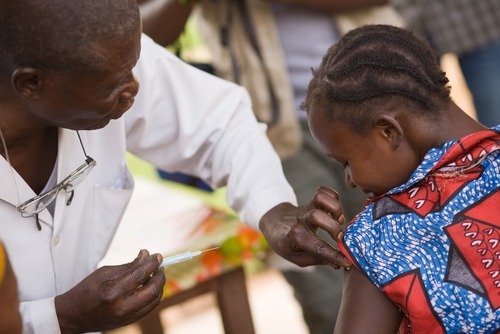
The World Health Organization (WHO) has recommended the first vaccine to treat malaria in children, a mosquito-borne disease that kills more than 260,000 children under the age of five annually in sub-Saharan Africa, in what public health officials have called a historic development.
“The long-awaited malaria vaccine for children is a breakthrough for science, child health and malaria control,” WHO Director-General Dr. Tedros Adhanom Ghebreyesus said. “Using this vaccine on top of existing tools to prevent malaria could save tens of thousands of young lives each year.”
Worldwide, malaria caused approximately 409,000 deaths in 2019 alone. The disease has been endemic for centuries, transmitted through the bites of infected mosquitoes, but until now, a vaccine has proved elusive, despite the fact that it is both preventable and curable. With the emergence and successful testing of global healthcare company GlaxoSmithKline’s RTS,S/AS01 malaria vaccine, however, WHO has recommended widespread vaccination of children in regions with moderate to high transmission of malaria, with the provision of four doses among those at least five months old.
The recommendation was based on results from a pilot study of more than 800,000 children in Ghana, Kenya and Malawi that has been ongoing since 2019. Those studies found that delivery of the vaccine is feasible, even with a worldwide pandemic raging, and that RTS,S increases equity in access to malaria prevention overall, improving lives for more than two-thirds of children in the three test countries not sleeping under a bed net.
“Even before the COVID-19 pandemic hit, progress against malaria was stalling,” said Dr Philippe Duneton, executive director of Unitaid. “This vaccine is a welcome new tool that, when used in combination with existing interventions like bed nets, has the potential to drive down malaria and extend protection to children across Africa. Pilot implementation has demonstrated how we can equitably reach children with this life-saving vaccine – now we need to ensure adequate and affordable supply to truly reignite the fight against malaria.”
More than 2.3 million doses have been given to date, and this widespread effort did not result in reductions of any other positive malaria prevention efforts.
What’s more: the vaccine has proven cost effective, even in hard-hit areas.
Financing for the program was provided largely through the efforts of Gavi, the Vaccine Alliance; the Global Fund to Fight AIDS, Tuberculosis and Malaria; and Unitaid. Now, with approval in hand, the vaccine will depend on funding decisions from the global health community as it seeks a broader rollout. Individual countries will also need to decide if they want to adopt the vaccine as part of national malaria control strategies.
GSK is already working with partners to create solutions for equitable and long-term access to the vaccine among those most in need. The company will donate up to 10 million doses of RTS,S for pilot use and provide up to 15 million doses annually at no more than 5 percent above production cost.
WHO estimates put total funding for malaria control and elimination at approximately $3 billion in 2019, with contributions from governments of endemic countries amounting to $900 million of that.
“GSK is proud that RTS,S, our ground-breaking malaria vaccine, developed over decades by our teams and partners, can now be made available to children in sub-Saharan Africa and other regions with moderate to high malaria transmission,” Thomas Breuer, Chief Global Health Officer of GSK, said. “This long-awaited landmark decision can reinvigorate the fight against malaria in the region at a time when progress on malaria control has stalled. Both real world evidence and clinical trial data show that RTS,S, alongside other malaria prevention measures, has the potential to save hundreds of thousands of lives.”




